Charles E W Bean, Diaries, AWM38 3DRL 606/249/1 - 1917 - 1932 - Part 13
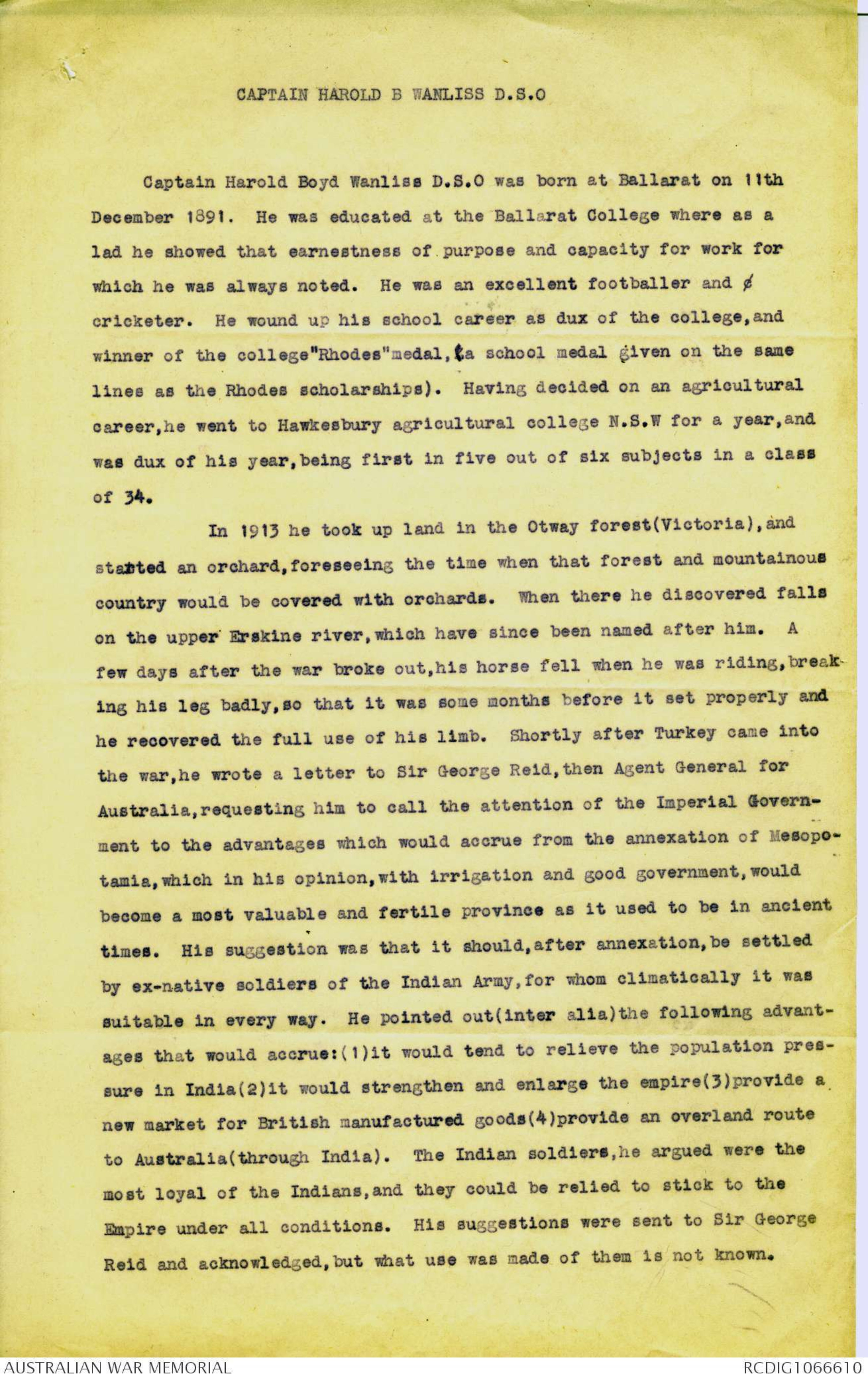
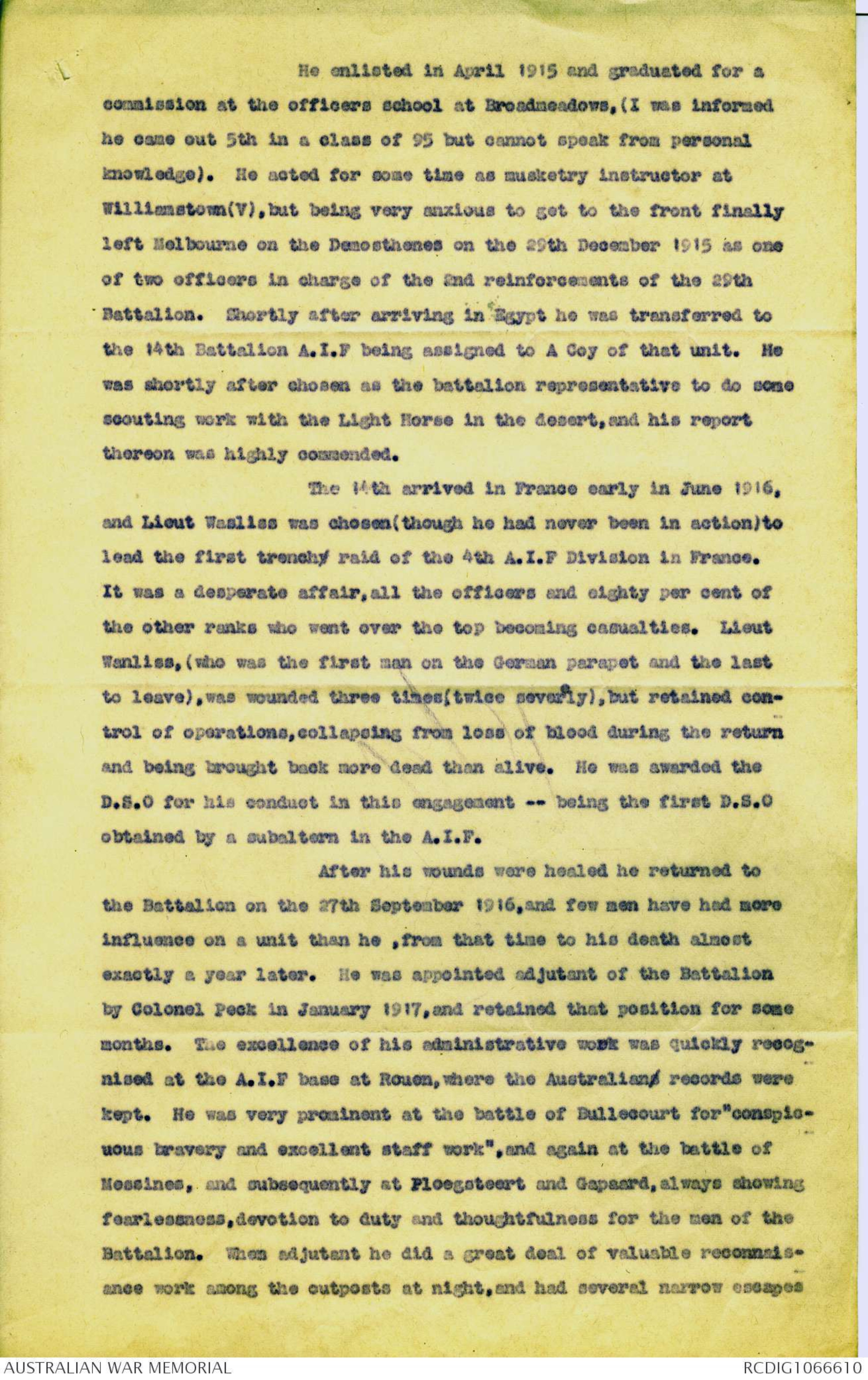
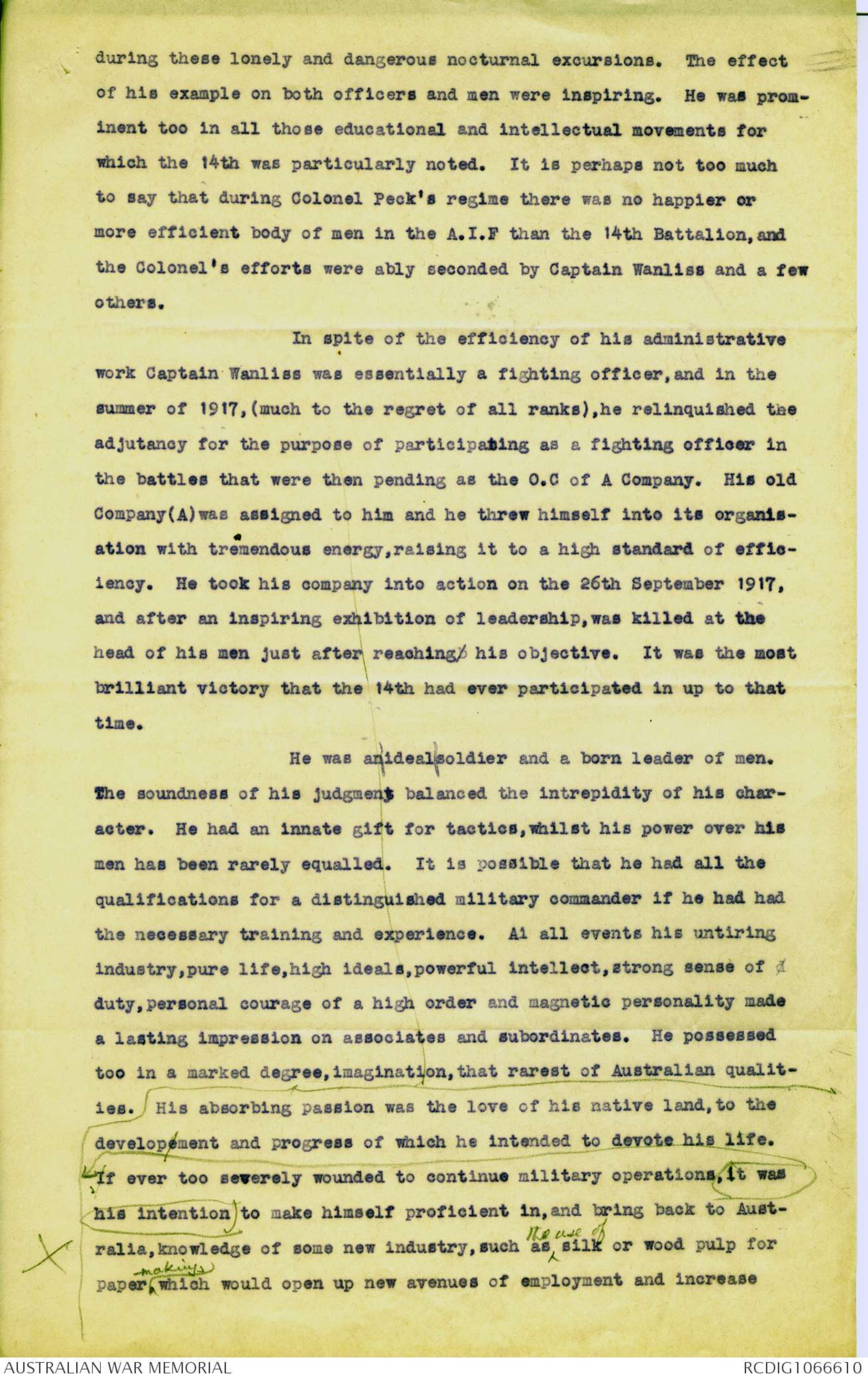
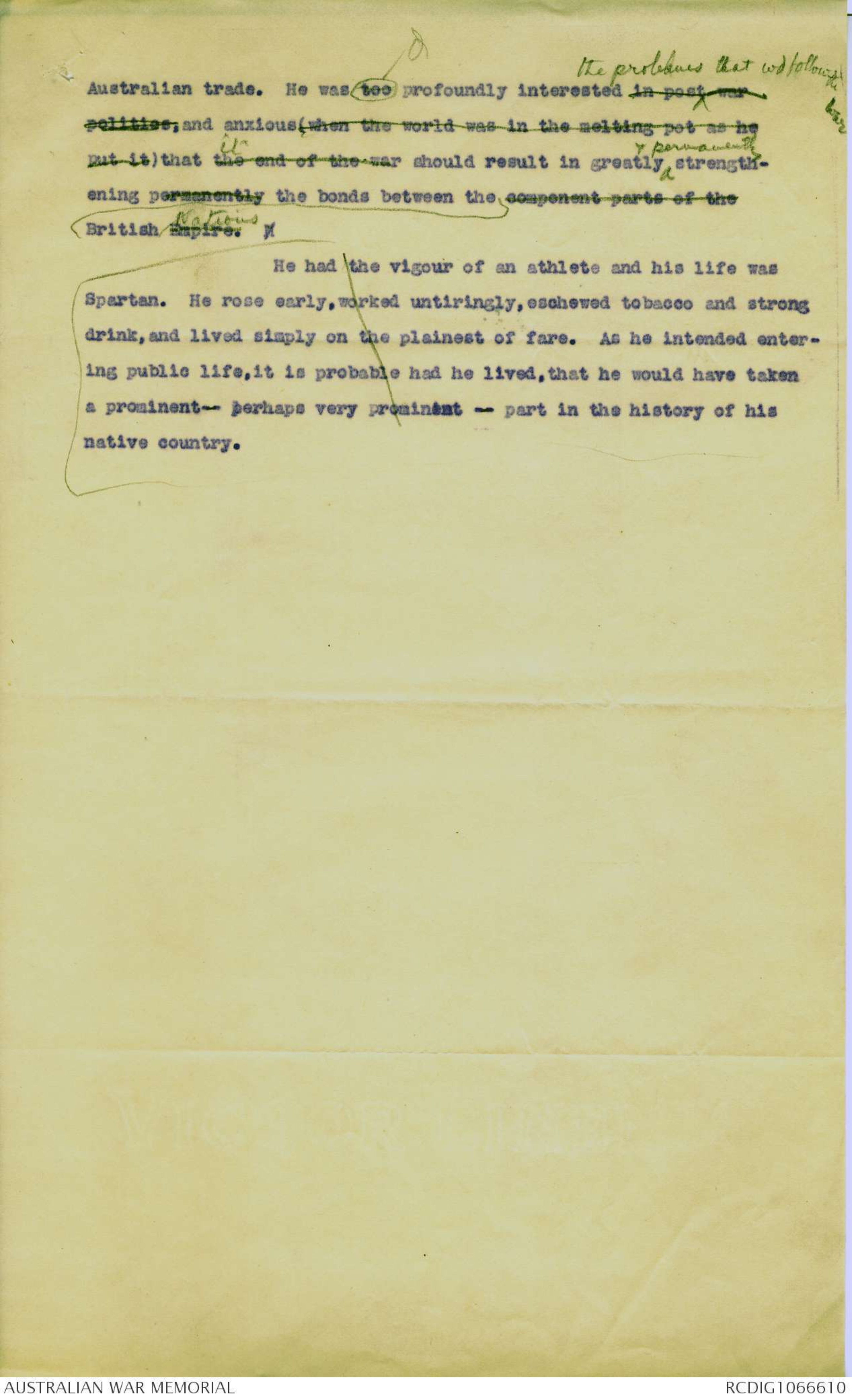
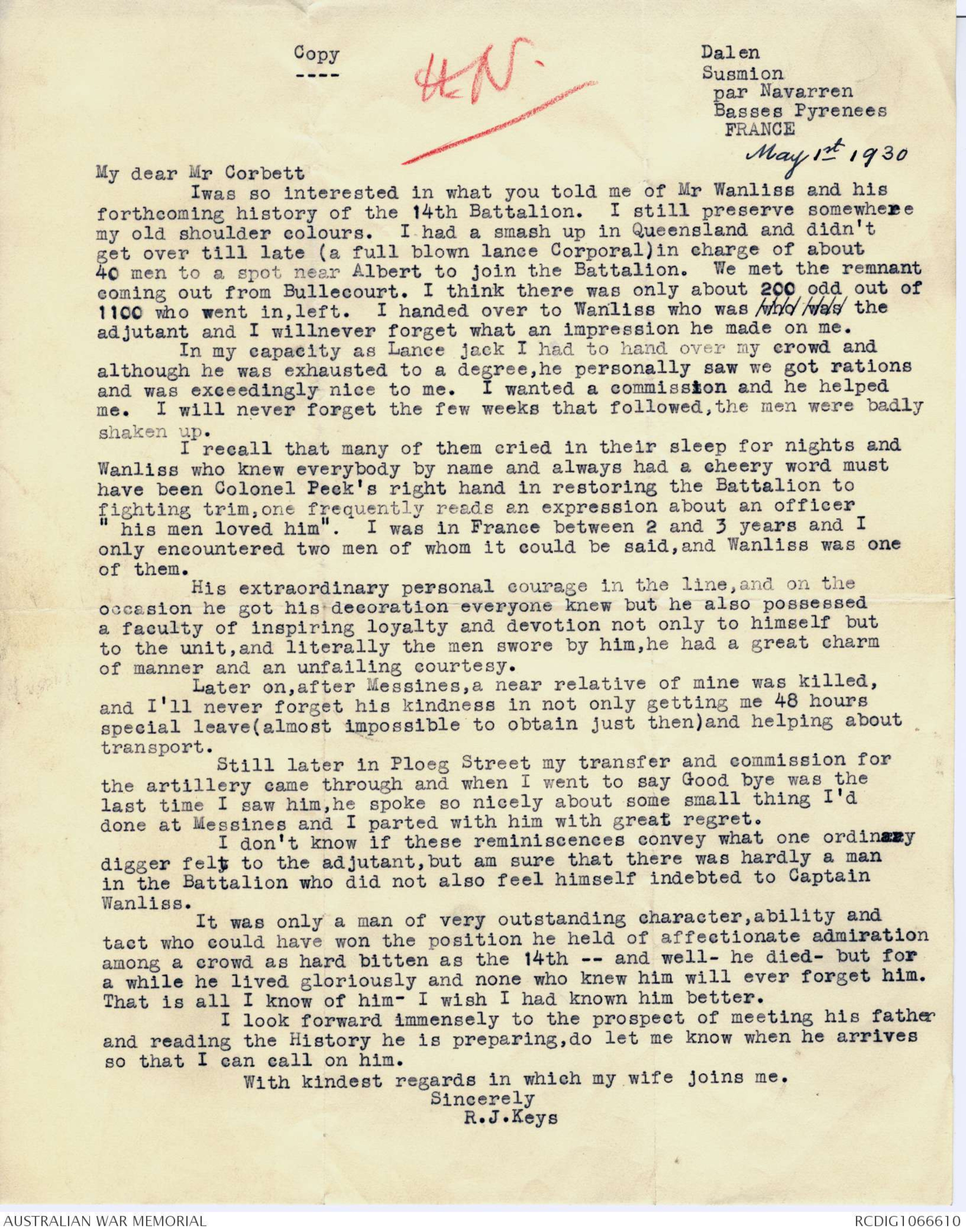
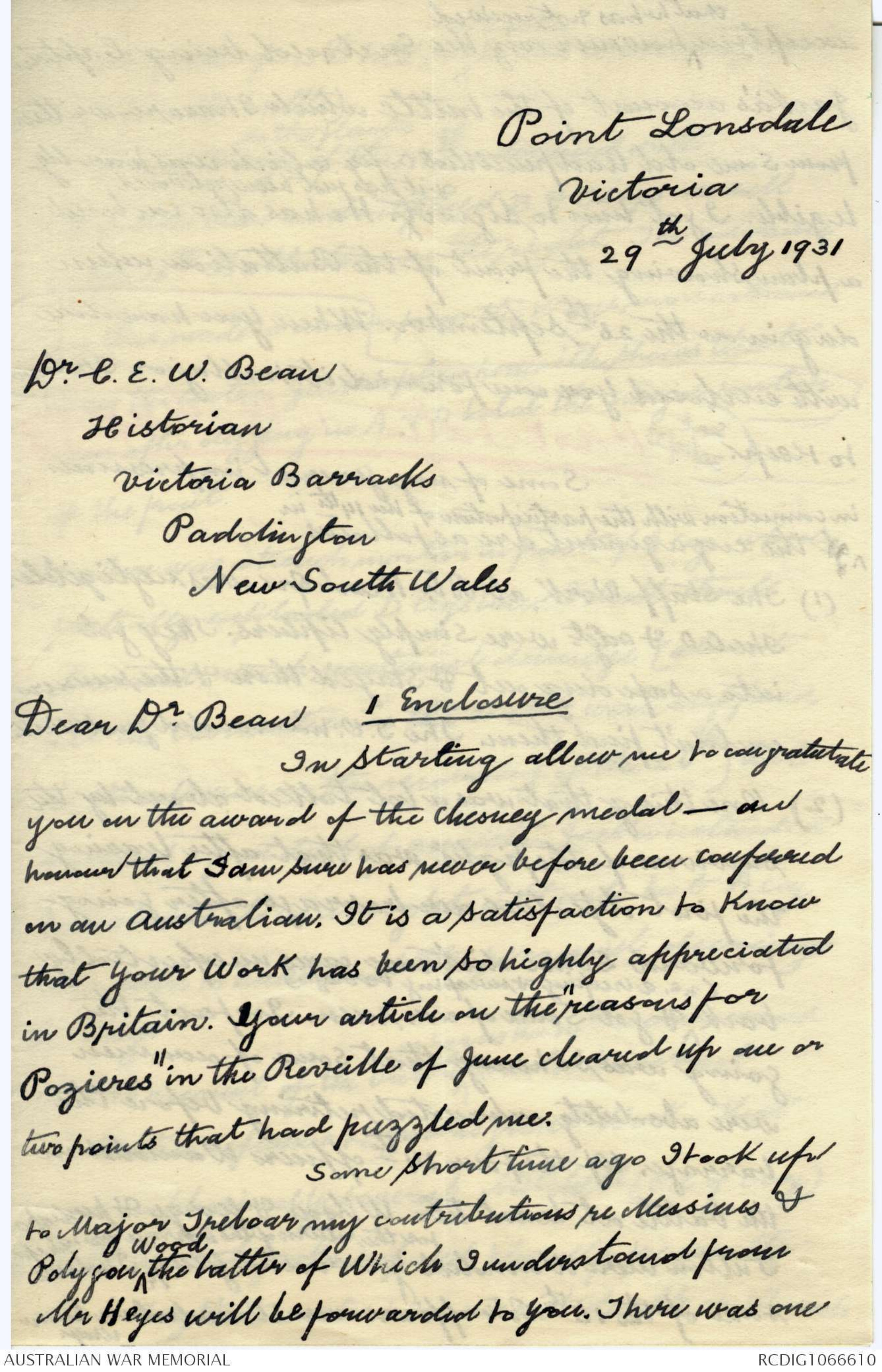
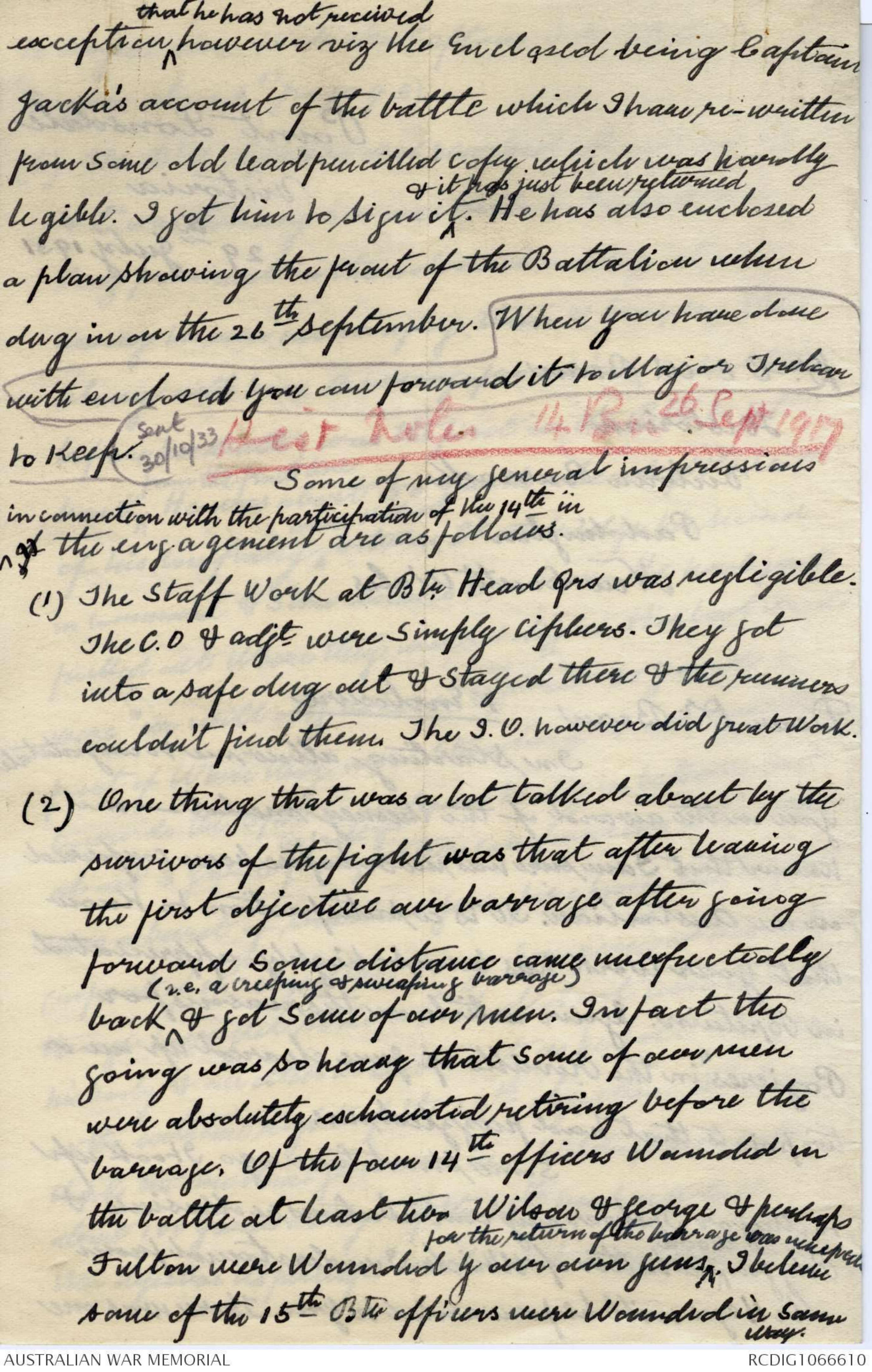
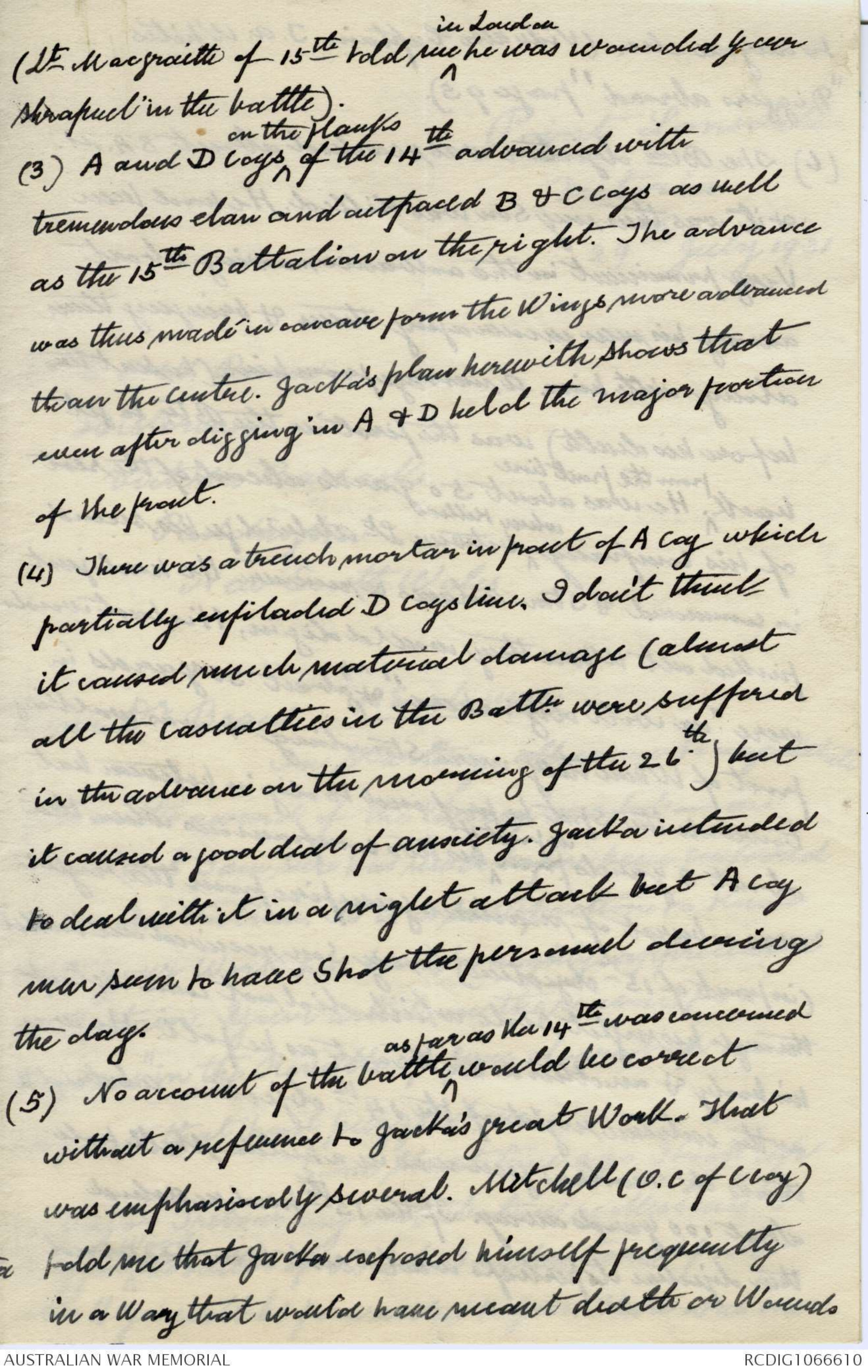
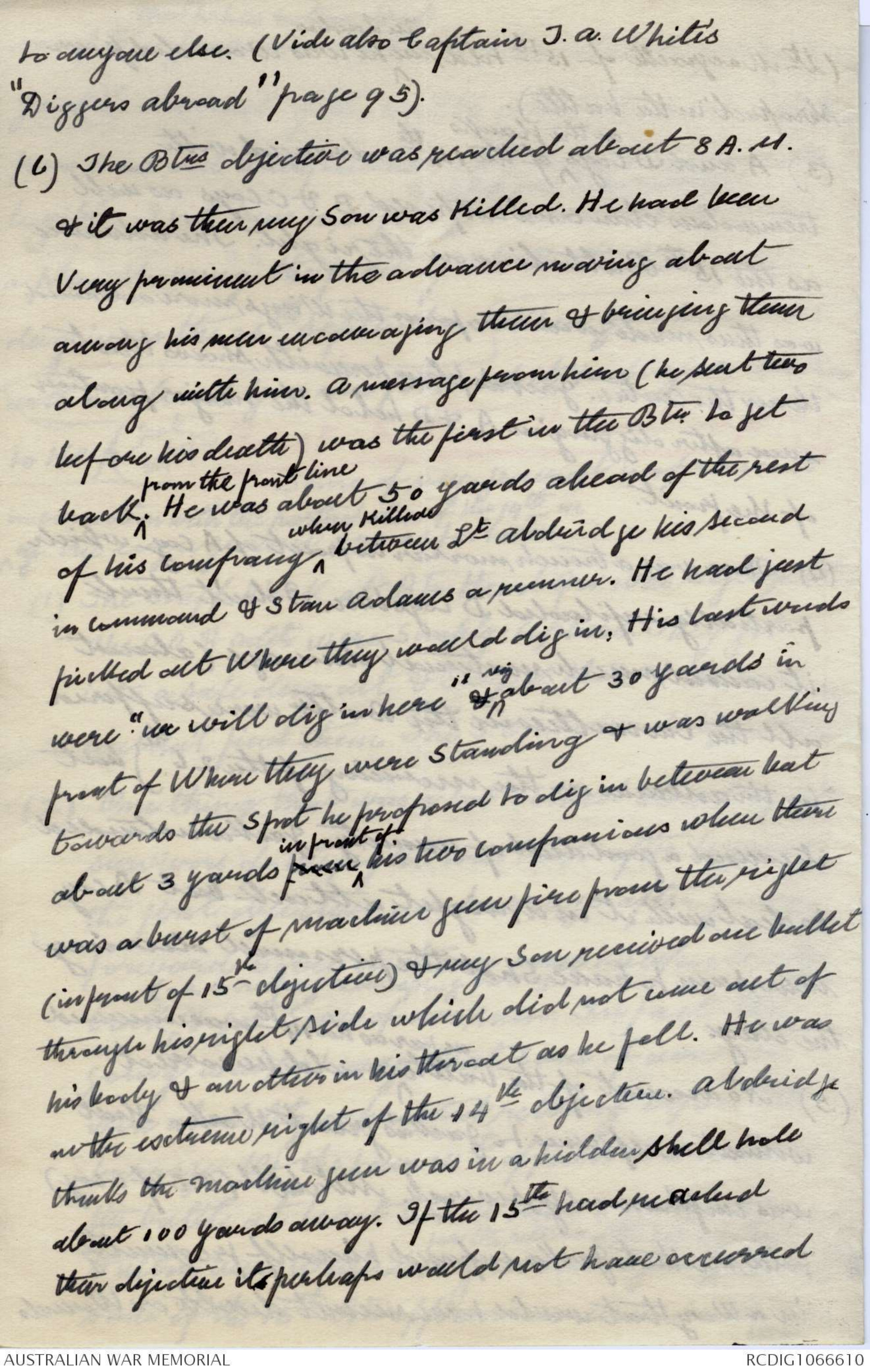
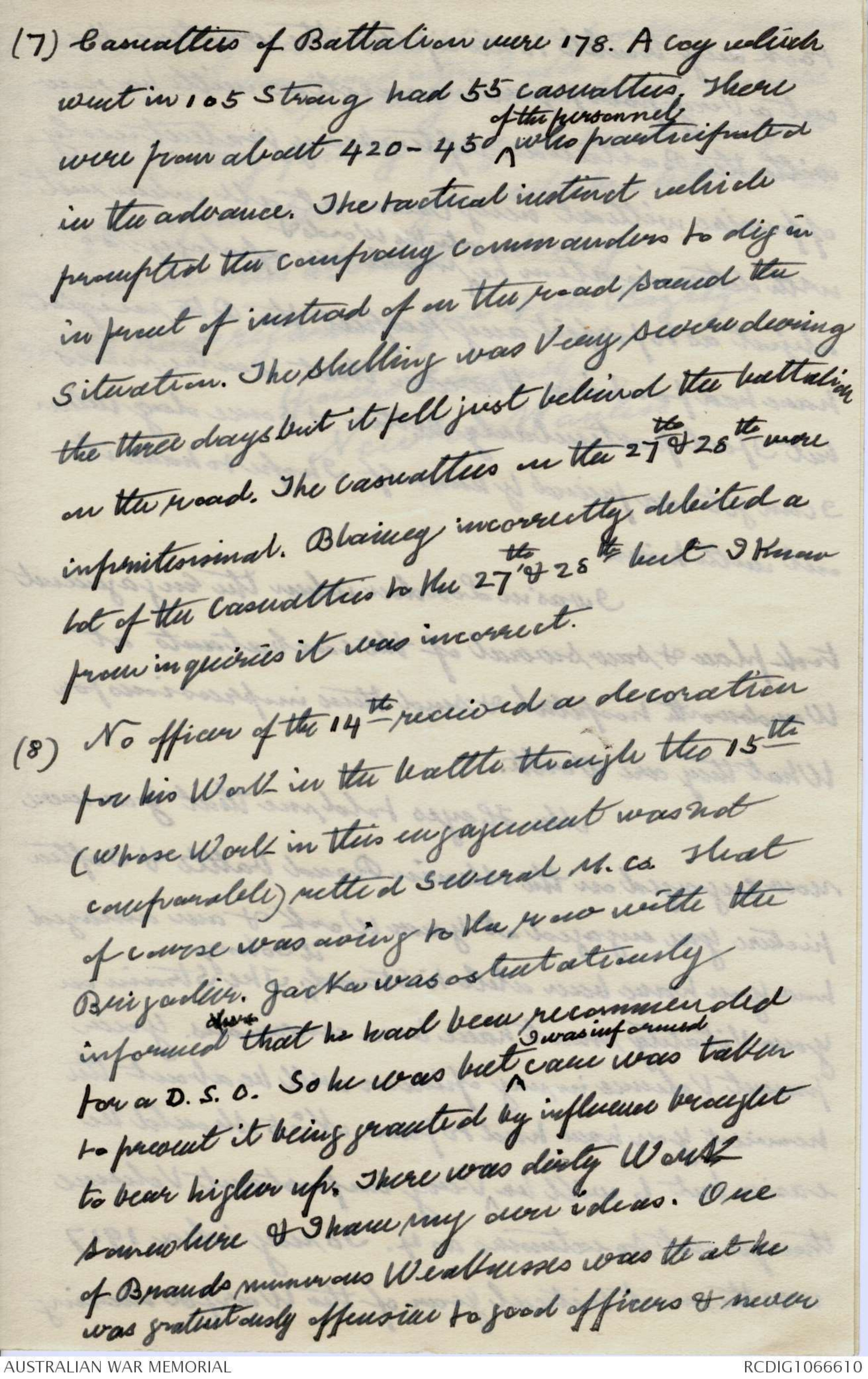
CAPTAIN HAROLD B WANLISS D.S.O
Captain Harold Boyd Wanliss D.S.O was born at Ballarat on 11th
December 1891. He was educated at the Ballarat College where as a
lad he showed that earnestness of purpose and capacity for work for
which he was always noted. He was an excellent footballer and c
cricketer. He wound up his school career as dux of the college, and
winner of the college "Rhodes"medal, (a school medal given on the same
lines as the Rhodes scholarships). Having decided on an agricultural
career, he went to Hawkesbury agricultural college N.S.W for a year, and
was dux of his year, being first in five out of six subjects in a class
of 34.
In 1913 he took up land in the Otway forest (Victoria), and
started an orchard, foreseeing the time when that forest and mountainous
country would be covered with orchards. When there he discovered falls
on the upper Erskine river, which have since been named after him. A
few days after the war broke out, his horse fell when he was riding, breaking
his leg badly, so that it was some months before it set properly and
he recovered the full use of his limb. Shortly after Turkey came into
the war, he wrote a letter to Sir George Reid, then Agent General for
Australia, requesting him to call the attention of the Imperial Government
to the advantages which would accrue from the annexation of Mesopotamia,
which in his opinion, with irrigation and good government, would
become a most valuable and fertile province as it used to be in ancient
times. His suggestion was that it should, after annexation, be settled
by ex-native soldiers of the Indian Army, for whom climatically it was
suitable in every way. He pointed out (inter alia) the following advantages
that would accrue: (1) it would tend to relieve the population pressure
in India (2) it would strengthen and enlarge the empire (3) provide a
new market for British manufactured goods (4) provide an overland route
to Australia (through India). The Indian soldiers, he argued were the
most loyal of the Indians, and they could be relied to stick to the
Empire under all conditions. His suggestions were sent to Sir George
Reid and acknowledged, but what use was made of them is not known.
He enlisted in April 1915 and graduated for a
commission at the officers school at Broadmeadows, (I was informed
he came out 5th in a class of 95 but cannot speak from personal
knowledge). He acted for some time as musketry instructor at
Williamstown(V), but being very anxious to get to the front finally
left Melbourne on the Demosthenes on the 29th December 1915 as one
of two officers in charge of the 2nd reinforcements of the 29th
Battalion. Shortly after arriving in Egypt he was transferred to
the 14th Battalion A.I.F being assigned to A Coy of that unit. He
was shortly after chosen as the battalion representative to do some
scouting work with the Light Horse in the desert, and his report
thereon was highly commended.
The 14th arrived in France early in June 1916,
and Lieut Wanliss was chosen (though he had never been in action) to
lead the first trenchy raid of the 4th A.I.F Division in France.
It was a desperate affair, all the officers and eighty per cent of
the other ranks who went over the top becoming casualties. Lieut
Wanliss, (who was the first man on the German parapet and the last
to leave), was wounded three times (twice severely), but retained control
of operations, collapsing from loss of blood during the return
and being brought back more dead than alive. He was awarded the
D.S.O for his conduct in this engagement -- being the first D.S.O
obtained by a subaltern in the A.I.F.
After his wounds were healed he returned to
the Battalion on the 27th September 1916, and few men have had more
influence on a unit than he, from that time to his death almost
exactly a year later. He was appointed adjutant of the Battalion
by Colonel Peck in January 1917, and retained that position for some
months. The excellence of his administrative work was quickly recognised
at the A.I.F base at Rouen, where the Australians records were
kept. He was very prominent at the battle of Bullecourt for "conspicuous
bravery and excellent staff work", and again at the battle of
Messines, and subsequently at Ploegsteert and Gapaard, always showing
fearlessness, devotion to duty and thoughtfulness for the men of the
Battalion. When adjutant he did a great deal of valuable reconnaisance
work among the outposts at night, and had several narrow escapes
during these lonely and dangerous nocturnal excursions. The effect
of his example on both officers and men were inspiring. He was prominent
too in all those educational and intellectual movements for
which the 14th was particularly noted. It is perhaps not too much
to say that during Colonel Peck’s regime there was no happier or
more efficient body of men in the A.I.F than the 14th Battalion, and
the Colonel’s efforts were ably seconded by Captain Wanliss and a few
others.
In spite of the efficiency of his administrative
work Captain Wanliss was essentially a fighting officer, and in the
summer of 1917, (much to the regret of all ranks), he relinquished the
adjutancy for the purpose of participating as a fighting officer in
the battles that were then pending as the O.C of A Company. His old
Company (A) was assigned to him and he threw himself into its organisation
with tremendous energy, raising it to a high standard of efficiency.
He took his company into action on the 26th September 1917,
and after an inspiring exhibition of leadership, was killed at the
head of his men just after reachingb his objective. It was the most
brilliant victory that the 14th had ever participated in up to that
time.
He was an\ideal\soldier and a born leader of men.
The soundness of his judgment balanced the intrepidity of his character.
He had an innate gift for tactics, whilst his power over his
men has been rarely equalled. It is possible that he had all the
qualifications for a distinguished military commander if he had had
the necessary training and experience. At all events his untiring
industry, pure life, high ideals, powerful intellect, strong sense of d
duty, personal courage of a high order and magnetic personality made
a lasting impression on associates and subordinates. He possessed
too in a marked degree, imagination, that rarest of Australian qualities.
His absorbing passion was the love of his native land, to the
developement and progress of which he intended to devote his life.
↓ If ever too severely wounded to continue military operations, it was
his Intention to make himself proficient in, and bring back to Australia,
[*X*] knowledge of some new industry, such as
∧ the use of silk or wood pulp for
paper ∧making which would open up new avenues of employment and increase
Australian trade. He was too profoundly interested in post war politics ^the problems that wd follow the war, and anxious (when the world was in the melting pot as heput it) that the end of the war ∧ it should result in greatly ∧ & permanently strengtheningpermanently the bonds between the component parts of the
British Empire Nations. M
He had the vigour of an athlete and his life was
Spartan. He rose early, worked untiringly, eschewed tobacco and strong
drink, and lived simply on the plainest of fare. As he intended entering
public life, it is probable had he lived, that he would have taken
a prominent -- perhaps very prominent -- part in the history of his
native country.
Copy
H.N.
Dalen
Susmion
par Navarren
Basses Pyrenees
FRANCE
May 1st 1930
My dear Mr Corbett
Iwas so interested in what you told me of Mr Wanliss and his
forthcoming history of the 14th Battalion. I still preserve somewhere
my old shoulder colours. I had a smash up in Queensland and didn’t
get over till late (a full blown lance Corporal) in charge of about
40 men to a spot near Albert to join the Battalion. We met the remnant
coming out from Bullecourt. I think there was only about 200 odd out of
1100 who went in, left. I handed over to Wanliss who was who was the
adjutant and I willnever forget what an impression he made on me.
In my capacity as Lance jack I had to hand over my crowd and
although he was exhausted to a degree, he personally saw we got rations
and was exceedingly nice to me. I wanted a commission and he helped
me. I will never forget the few weeks that followed, the men were badly
shaken up.
I recall that many of them cried in their sleep for nights and
Wanliss who knew everybody by name and always had a cheery word must
have been Colonel Peck’s right hand in restoring the Battalion to
fighting trim, one frequently reads an expression about an officer
"his men loved him". I was in France between 2 and 3 years and I
only encountered two men of whom it could be said, and Wanliss was one
of them.
His extraordinary personal courage in the line, and on the
occasion he got his decoration everyone knew but he also possessed
a faculty of inspiring loyalty and devotion not only to himself but
to the unit, and literally the men swore by him, he had a great charm
of manner and an unfailing courtesy.
Later on, after Messines, a near relative of mine was killed,
and I'll never forget his kindness in not only getting me 48 hours
special leave (almost impossible to obtain just then) and helping about
transport.
Still later in Ploeg Street my transfer and commission for
the artillery came through and when I went to say Good bye was the
last time I saw him; he spoke so nicely about some small thing I’d
done at Messines and I parted with him with great regret.
I don't know if these reminiscences convey what one ordinary
digger felt to the adjutant, but am sure that there was hardly a man
in the Battalion who did not also feel himself indebted to Captain
Wanliss.
It was only a man of very outstanding character, ability and
tact who could have won the position he held of affectionate admiration
among a crowd as hard bitten as the 14th -- and well - he died - but for
a while he lived gloriously and none who knew him will ever forget him.
That is all I know of him - I wish I had known him better.
I look forward immensely to the prospect of meeting his father
and reading the History he is preparing, do let me know when he arrives
so that I can call on him.
With kindest regards in which my wife joins me.
Sincerely
R.J.Keys
Point Lonsdale
Victoria
29th July 1931
Dr. C.E.W. Bean
Historian
Victoria Barracks
Paddington
New South Wales
Dear Dr. Bean 1 Enclosure
In starting allow me to congratulate
you in the award of the Chesney Medal - an
honour that I am sure has never before been conferred
on an Australian. It is a satisfaction to know
that your Work has been so highly appreciated
in Britain. Your article on the "reasons for
Pozieres" in the Reveille of June cleared up one or
two points that had puzzled me.
Some short time ago I took up
to Major Treloar my contributions re Messines &
Polygon ∧ Wood the latter of Which I understand from
Mr Heyes will be forwarded to you. There was one
exception ∧that he has not received however viz the enclosed being Captain
Jacka's account of the battle which I have re-written
from some old lead pencilled copy which was hardly
legible. I got him to sign it ∧& it has just been returned. He has also enclosed
a plan showing the front of the Battalion when
dug in on the 26th September. When you have done
with enclosed you can forward it to Major Treloar
to keep. (sent 30/10/33 Hist notes 14 Bn 26 Sept 1917
Some of my general impressions
in connection with the participation of the 14th in of the engagement are as follows.
(1) The Staff Work at Btn Head Qrs was negligible.
The C.0 & adjt were simply ciphers. They got
into a safe dug out & stayed there & the runners
couldn't find them. The I.O. however did great work.
(2) One thing that was a lot talked about by the
survivors of the fight was that after leaving
the first objective our barrage after going
forward some distance came unexpectedly
back ∧(i.e. a creeping & [[sweeping?]] barrage) & got some of our men. In fact the
going was so heavy that some of our men
were absolutely exhausted retiring before the
barrage. Of the four 14th officers wounded in
the battle at least two Wilson & George & perhaps
Fulton were wounded by our own guns ∧for the return of the barrage was unexpected. I believe
some of the 15th Btn officers were wounded in same way
(Lt Macgraitte of 15th told me ∧in London he was wounded by our
shrapnel in the battle).
(3) A and D Coys ∧ on the flanks of the 14th advanced with
tremendous elan and outpaced B & C Coys as well
as the 15th Battalion on the right. The advance
was thus made in concave form the wings more advanced
than the centre. Jacka's plan herewith shows that
even after digging in A & D held the major portion
of the front.
(4) There was a trench mortar in front of A Coy which
partially enfiladed D Coys line. I don't think
it caused much material damage (almost
all the casualties in the Battn were suffered
in the advance on the morning of the 26th) but
it caused a good deal of anxiety. Jacka intended
to deal with it in a night attack but A Coy
men seem to have shot the personnel during
the day.
(5) No account of the battle ∧as far as the 14th was concerned would be correct
without a reference to Jacka's great work. That
was emphasised by several. Mitchell (O.C of C coy)
told me that Jacka exposed himself frequently
in a way that would have meant death or wounds
to anyone else. (Vide also Captain J. A. White's
"Diggers abroad" page 95).
(6) The Btns objective was reached about 8 A.M.
& it was their my son was killed. He had been
very prominent in the advance moving about
among his men encouraging them & bringing them
along with him. A message from him (he sent two
before his death) was the first in the Btn to get
back ∧ from the front line. He was about 50 yards ahead of the rest
of his company ∧when killed between Lt Aldridge his second
in command & Stan Adams a runner. He had just
picked out where they would dig in. His last words
were "we will dig in here" & ∧[[viz?]] about 30 yards in
front of Where they were standing & was walking
towards the spot he proposed to dig in between but
about 3 yards ∧in front of his two companions when there
was a burst of machine gun fire from the right
(in front of 15th objective) & my son received one bullet
through his right side which did not come out of
his body & another in his throat as he fell. He was
on the extreme right of the 14th objective. Aldridge
thinks the machine gun was in a hidden shell hole
about 100 yards away. If the 15th had reached
their objective it perhaps would not have occurred
(7) Casualties of Battalion were 178. A coy which
went in 105 strong had 55 casualties. There
were from about 420-450 ∧of the personnel who participated
in the advance. The tactical instinct which
prompted the company commanders to dig in
in front of instead of in the road saved the
situation. The shelling was very severe during
the three days but it fell just behind the battalion
on the road. The casualties on the 27th & 28th were
infinitesimal. Blainey incorrectly debited a
lot of the casualties to the 27th & 28th but I know
from inquiries it was incorrect.
(8) No officer of the 14th received a decoration
for his work in the battle though the 15th
(whose work in this engagement was not
comparable) netted several M.Cs. that
of course was owing to the row with the
Brigadier. Jacka was ostentatiously
informed xxxx that he had been recommended
for a D.S.O. So he was but ^I was informed care was taken
to prevent it being granted by influence brought
to bear higher up. There was dirty work
somewhere & I have my own ideas. One
of Brands numerous weaknesses was that he
was gratuitously effusive to good officers & never
 Sam scott
Sam scottThis transcription item is now locked to you for editing. To release the lock either Save your changes or Cancel.
This lock will be automatically released after 60 minutes of inactivity.